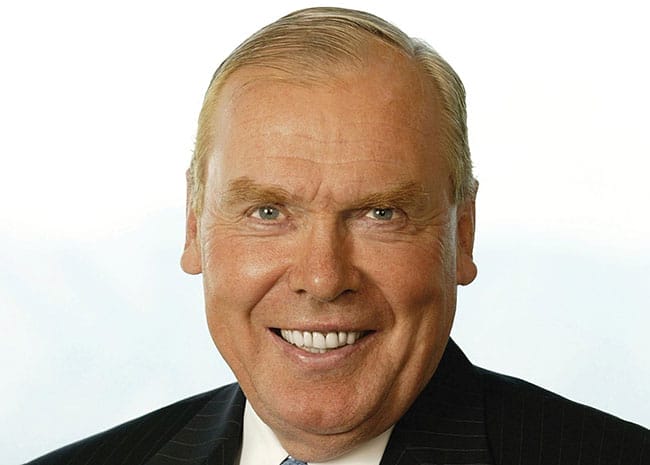Try summing up the impact of Jon M. Huntsman Sr. W59 HON96 upon the University of Pennsylvania and the Wharton School. Upon the petrochemical industry. The global business world. Upon philanthropy. The race for the cure for cancer in particular. It’s nearly impossible to list all of the man’s accomplishments, let alone provide detail and context.
For his latest accomplishment, Huntsman did just that. He culminated a 30-year effort to record and analyze his life by publishing his autobiography, Barefoot to Billionaire: Reflections on a Life’s Work and a Promise to Cure Cancer.
Wharton Magazine had the honor and the pleasure to talk with him about his book. What follows is an excerpt of the conversation.
WHARTON MAGAZINE: What has it been like to share very personal details of your life in such a big, public way?
JON M. HUNTSMAN SR.: I spent almost a year before I finished the book and rewrote it and rewrote and rewrote it—like seven or eight times—visiting with each of my family members time and time again to make sure they were comfortable with the content on the kidnapping or the death of my daughter—so I would not infringe upon any sacred feelings. The family is in total harmony, and we all feel very good about what I wrote.
Like any other family, we all go through the same trials and tribulations, irrespective of wealth or position. So I don’t consider myself any different from any other family man. We all go through the same amount of challenges and difficulties, and by being honest, I can relate much better to other families who have experienced the heartaches and valleys of life and also experienced the jubilation of being on the mounts.
WM: What sort of feedback have you gotten from the book?
HUNTSMAN: One bit of feedback I’ve received from church members is how frank and open I’ve been about my life and the things I’ve done. It’s hard to be a riverboat gambler and put everything on the line and not enjoy a good game of blackjack. You can’t be one thing one day, and another thing another day. We are who we are.
WM: When students pick up the book, what do you hope they take away from it?
HUNTSMAN: No matter how much money we make in a lifetime, the real heart of life is what we give back. The major segment of someone’s eulogy is the kindness of their heart. In a eulogy, people don’t spend much time talking about what [the deceased has] done in the educational field or what they’ve done for their employers or how many civic institutions one belonged to. Inevitably, eulogies talk about people’s goodness, their honor, what they’ve done for others, how gracious they’ve been for people who are down and out.
WM: How can successful businesspeople more effectively give back to their communities?
HUNTSMAN: It gets to the heart of the problem: No matter what stories I tell and how I define my own life, everyone in his or her own personal way must define his or her ability to help others. I have been somewhat overwhelmed, surprised, shocked, by the number of people I know who give very, very little to charity and who do very small amounts of contributions to mankind. I frankly get a little bit upset with people like that. People of wealth should take it upon themselves not as an obligation but as a sacred duty to give away a large percentage of what they’ve been fortunate enough to accumulate. There is no such thing as a 100 percent self-made person. We have a duty to share it with others. It’s not an option at all. (Editor’s note: Huntsman is one of only 19 people who have donated more than $1 billion in their lifetimes.)
WM: Why do you have such passion for fly fishing?
HUNTSMAN: We had to fish the little streams and rivers of Idaho to put meat on the table [as a child]. It was very important that I brought home two to three fish every day. It was very important that we shot a deer or duck. That was what we served. That and the veggies that we would grow.
I loved fishing so much as a boy. I had to do it for survival … but fly-fishing is a really great sport too. And a really difficult sport because you don’t have any hook on the line. It’s all catch and release. I really love the challenge.
—Matthew Brodsky
For more: Huntsman was on campus in November for, among many things, a book signing at the campus store and interview with Adam Grant, professor of management and the Class of 1965 Chair. Watch the interview above on Knowledge@Wharton.
























